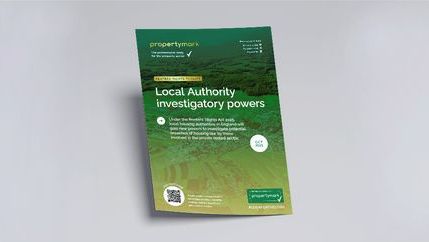
The value of agent voices
Propertymark’s report, Reforming the PRS: Letting Agent Views of the Renters (Reform) Bill, explores agents’ views on the proposed legislation.
Letting agents fulfil a myriad of hidden roles as mediators, gatekeepers, market movers and compliance managers. They have a deep understanding of the sector and the properties and landlords within it, making them highly qualified to provide a range of material insights into the appropriateness of the Bill.
Impact of unintended consequences could be devastating
The overwhelming majority of agents say they expect more landlords to exit the sector once the Bill is passed, and 83% are concerned that it will also discourage new entrants.
Specifically, 64% did not believe that local authorities would have sufficient resources to enforce the new legislation effectively and 88% did not believe that the courts would have the resources required to deal with the removal of ‘no fault’ evictions.
Warnings on fixed-term tenancies must be heeded
We asked our agents to what extent they agreed that the removal of fixed-term tenancies would impact themselves/landlords or tenants negatively. In both cases, the vast majority (80% and 94% respectively) agreed to some extent. In addition, 70% of agents agreed that student lets should be exempt from the removal of fixed-term tenancies.
When the periodic private residential tenancy was introduced in Scotland, the same warnings were voiced and discounted, resulting in a student housing supply crisis as landlords moved their properties to other markets.
We recommend that a tenant should keep the ability to agree to a fixed-term tenancy where it is mutually beneficial for both parties.
Investment relies on possession grounds
For landlords to continue to find the PRS a sound investment they must be reassured that there are clear and reasonable mechanisms to regain possession of their property.
There was significant support from agents for more mandatory grounds to be introduced by the Bill. 90% agreed that ‘securing a let based on false information’, ‘repeated late payment of rent’ and ‘breach of contract’ should not be discretionary as currently proposed.
Propertymark also recommends that two new possession grounds should be added:
- Tenants refusing access
- Neglect or damage resulting in costs more than the deposit amount
New Ombudsman unlikely to address issues with courts
The Bill intends the Ombudsman to provide fair, impartial, and binding resolution to many issues and prove quicker, cheaper, and less adversarial than the court system.
This has been met with significant scepticism, as 97% of agents believe the lack of a specialist housing court would undermine the ability of both agents and landlords to evict tenants under new grounds.
Policymakers should consider allowing private landlords to join one of the existing redress schemes for the private rented sector (Property Redress Scheme or The Property Ombudsman), introduce a statutory code to adjudicate against and set out a long-term plan for the introduction of a specialist housing court.
The Bill should also include the requirement for an inventory and a check-in/check-out report at the start and end of a tenancy to speed up the return of deposits and prevent disputes.
Property portal should supersede licensing
Landlord registration schemes are already compulsory in Scotland, Northern Ireland, and Wales. However, they have had mixed success and offer significant opportunities for lessons to be learned in England. Based on the present proposals only just more than half of agents agreed it would lead to an improvement in standards.
To be more effective, the PRS Database and Property Portal should be expanded to include qualification, registration, and regulation requirements for property agents. If the portal is introduced, the requirement for local licensing schemes should be removed.
A critical role in housing flexibility
The PRS has stepped in to fill the shortfall in social housing and decreasing rates of homeownership in the UK. Whilst this rapid growth over the last two decades has brought challenges - with the emergence of generation rent and higher representation of vulnerable groups living in the sector - the majority of PRS homes meet the Decent Homes Standard (77%), the majority of tenancies end because the tenant wishes to move (77%), the majority of tenants find it easy to pay their rent (74%), and PRS tenants report higher wellbeing scores than social renters.
Campaigning - and what members can do
Propertymark is campaigning to ensure the UK Government’s plans to reform the private rented sector are fit for purpose and will work in practice. So far, we’ve engaged with senior officials at DLUHC, provided evidence at Minister-led roundtables and made your views clear at select committee sessions in Parliament.
Writing to your MP as a local resident and business owner or employee is a powerful way of ensuring your voice is heard. There is huge demand for rented property across the country, so it is vital that legislative change is fit for purpose and does not cause landlords to leave the sector or deter new entrants from providing much needed homes to rent.







